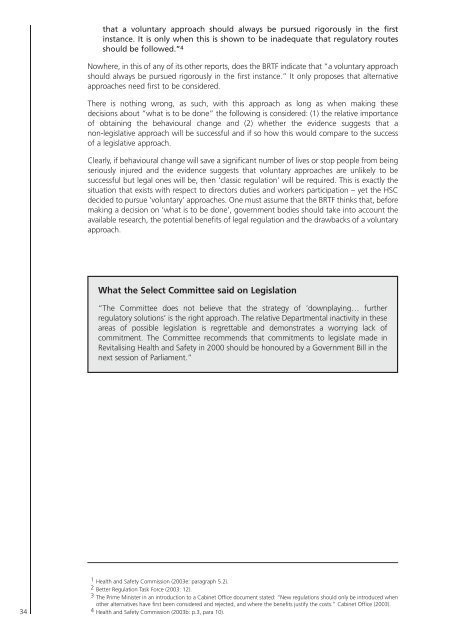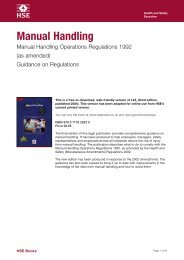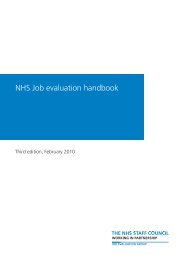Making Companies Safe - what works? (CCA ... - Unite the Union
Making Companies Safe - what works? (CCA ... - Unite the Union
Making Companies Safe - what works? (CCA ... - Unite the Union
Create successful ePaper yourself
Turn your PDF publications into a flip-book with our unique Google optimized e-Paper software.
that a voluntary approach should always be pursued rigorously in <strong>the</strong> first<br />
instance. It is only when this is shown to be inadequate that regulatory routes<br />
should be followed.” 4<br />
Nowhere, in this of any of its o<strong>the</strong>r reports, does <strong>the</strong> BRTF indicate that “a voluntary approach<br />
should always be pursued rigorously in <strong>the</strong> first instance.” It only proposes that alternative<br />
approaches need first to be considered.<br />
There is nothing wrong, as such, with this approach as long as when making <strong>the</strong>se<br />
decisions about “<strong>what</strong> is to be done” <strong>the</strong> following is considered: (1) <strong>the</strong> relative importance<br />
of obtaining <strong>the</strong> behavioural change and (2) whe<strong>the</strong>r <strong>the</strong> evidence suggests that a<br />
non-legislative approach will be successful and if so how this would compare to <strong>the</strong> success<br />
of a legislative approach.<br />
Clearly, if behavioural change will save a significant number of lives or stop people from being<br />
seriously injured and <strong>the</strong> evidence suggests that voluntary approaches are unlikely to be<br />
successful but legal ones will be, <strong>the</strong>n ‘classic regulation’ will be required. This is exactly <strong>the</strong><br />
situation that exists with respect to directors duties and workers participation – yet <strong>the</strong> HSC<br />
decided to pursue ‘voluntary’ approaches. One must assume that <strong>the</strong> BRTF thinks that, before<br />
making a decision on ‘<strong>what</strong> is to be done’, government bodies should take into account <strong>the</strong><br />
available research, <strong>the</strong> potential benefits of legal regulation and <strong>the</strong> drawbacks of a voluntary<br />
approach.<br />
What <strong>the</strong> Select Committee said on Legislation<br />
“The Committee does not believe that <strong>the</strong> strategy of ‘downplaying… fur<strong>the</strong>r<br />
regulatory solutions’ is <strong>the</strong> right approach. The relative Departmental inactivity in <strong>the</strong>se<br />
areas of possible legislation is regrettable and demonstrates a worrying lack of<br />
commitment. The Committee recommends that commitments to legislate made in<br />
Revitalising Health and <strong>Safe</strong>ty in 2000 should be honoured by a Government Bill in <strong>the</strong><br />
next session of Parliament.”<br />
34<br />
1 Health and <strong>Safe</strong>ty Commission (2003e: paragraph 5.2).<br />
2 Better Regulation Task Force (2003: 12).<br />
3 The Prime Minister in an introduction to a Cabinet Office document stated: “New regulations should only be introduced when<br />
o<strong>the</strong>r alternatives have first been considered and rejected, and where <strong>the</strong> benefits justify <strong>the</strong> costs.” Cabinet Office (2003).<br />
4 Health and <strong>Safe</strong>ty Commission (2003b: p.3, para 10).
















